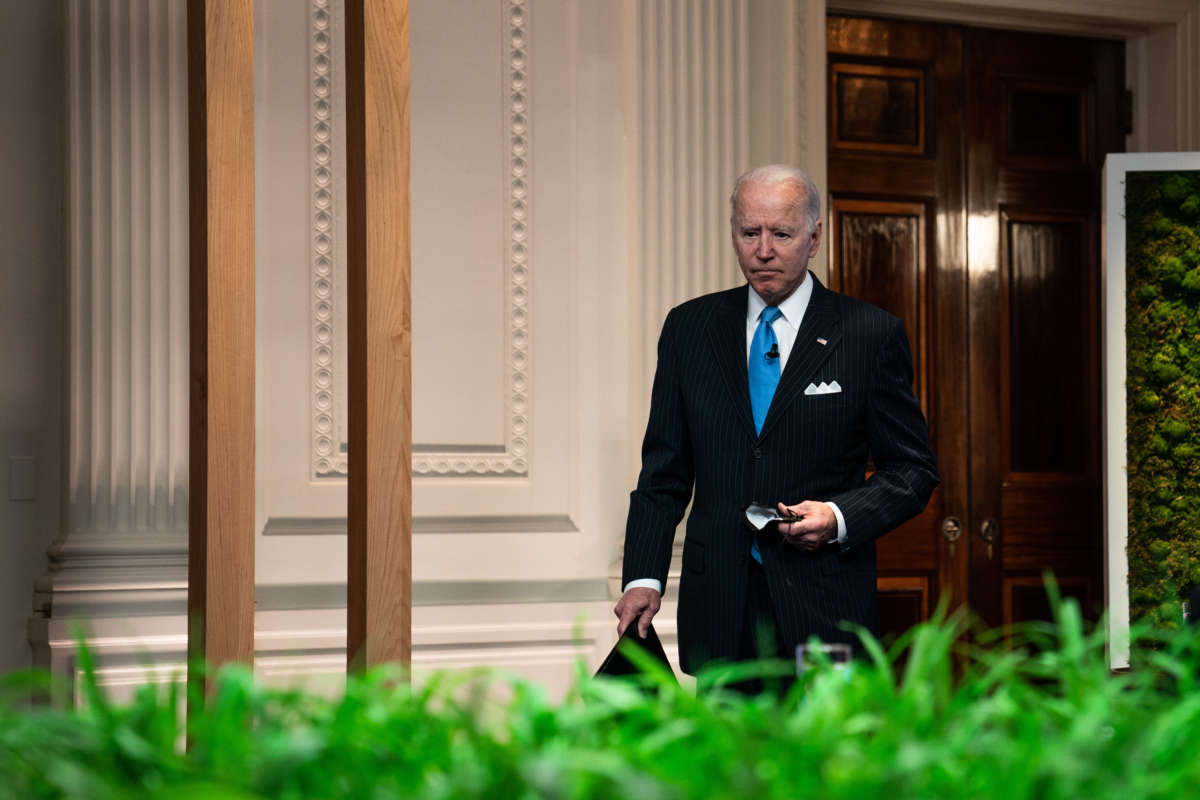Support justice-driven, accurate and transparent news — make a quick donation to Truthout today!
President Joe Biden has been in office for nearly 100 days, and so far, most Americans have a positive view of his presidency.
However, Biden’s polling numbers are not as high as most presidents’ within their first 100 days, but given the extreme divide in U.S. politics today, that’s perhaps unsurprising.
Biden has received mostly positive marks from a majority of polls in recent days. His RealClearPolitics (RCP) average approval as of Monday morning sits at 53.1 percent, with 41.5 percent saying they disapprove. Those approval numbers have been consistent throughout the last 100 days: Biden’s highest average in the RCP list of polls has reached as high as 55.8 approval, while his lowest approval rating average was 52.7 percent.
Polls suggest that a respondent’s approval of the president closely aligns with their ideology, as a Reuters/Ipsos poll conducted April 21-22 finds that only 17 percent of GOP respondents approved of Biden’s time in office so far, while 92 percent of Democrats gave him positive marks. One-in-two independents also gave him a positive rating.
Biden has higher approval ratings than his immediate predecessor, former President Donald Trump, after his first 100 days in office. Trump, who lost the popular vote but won the Electoral College in the 2016 presidential election, had less successful first 100 days, according to voters at the time, with only 42 percent saying they approved of his actions.
Other presidents had higher ratings within the first couple of months of their first term. Former President Barack Obama had a 69 percent approval rating in his first 100 days, while former President George W. Bush had a 63 percent approval rating. In fact, besides Trump, Biden only outperforms Gerald Ford in a list of other presidents’ approval ratings within their first 100 days.
An NBC News poll shows 44 percent of Americans believe the beginning of Biden’s presidency has been “great” or “good,” with 21 percent saying he had “only a fair” start to his time in office. Just 34 percent said he was starting things off poorly as president.
On the issues that matter to most Americans, voters seem to give Biden mostly positive marks. When a recent NBC News poll asked on what topics they believed were the top-five issues facing the U.S. right now, voters responded by saying they were COVID-19, “uniting the country,” race relations, the economy and immigration, in that order.
Sixty-nine percent of voters approve of how Biden is handling the pandemic, with 52 percent saying he’s doing a good job so far on efforts to bridge the U.S. partisan divide. A plurality of Americans (49 percent) give him good marks on “race relations.” Fifty-two percent say he’s doing well on the economy.
The only issue in that top-five list where Biden is receiving a more negative reception than a positive one is on immigration, where only one-third of the country (33 percent) approve of his job on that topic so far, with 59 percent disapproving.
Biden’s failure to address immigration issues, such as long detention times for children that have arrived at the border, are possibly fueling negative ratings on this point.
While some of the failed and inhumane practices that existed under Trump, like the family separation policy, have ended, Biden has been criticized for taking up reforms that address the roots of the migration crisis.
While an ABC News/Washington Post poll found that 40 percent of voters described him as being “too liberal,” other data that shows voters want him to move more aggressively on progressive policy issues. In that same poll, a majority of respondents (52 percent) said they supported Biden’s $2 trillion infrastructure proposal, while nearly 6-in-10 voters (58 percent) said they backed raising the corporate tax rate to 28 percent.
Indeed, on left-leaning issues, voters want Biden to do more, not less. A Data for Progress poll from April 16-19, for example, found that 70 percent of voters want the U.S. to lead on the climate crisis. That same poll also found substantial support for the infrastructure plan being pushed by Biden — with backing for the proposal increasing by 3 points when respondents in the poll were told that green energy policies and other aspects addressing the climate crisis were included.
Press freedom is under attack
As Trump cracks down on political speech, independent media is increasingly necessary.
Truthout produces reporting you won’t see in the mainstream: journalism from the frontlines of global conflict, interviews with grassroots movement leaders, high-quality legal analysis and more.
Our work is possible thanks to reader support. Help Truthout catalyze change and social justice — make a tax-deductible monthly or one-time donation today.
